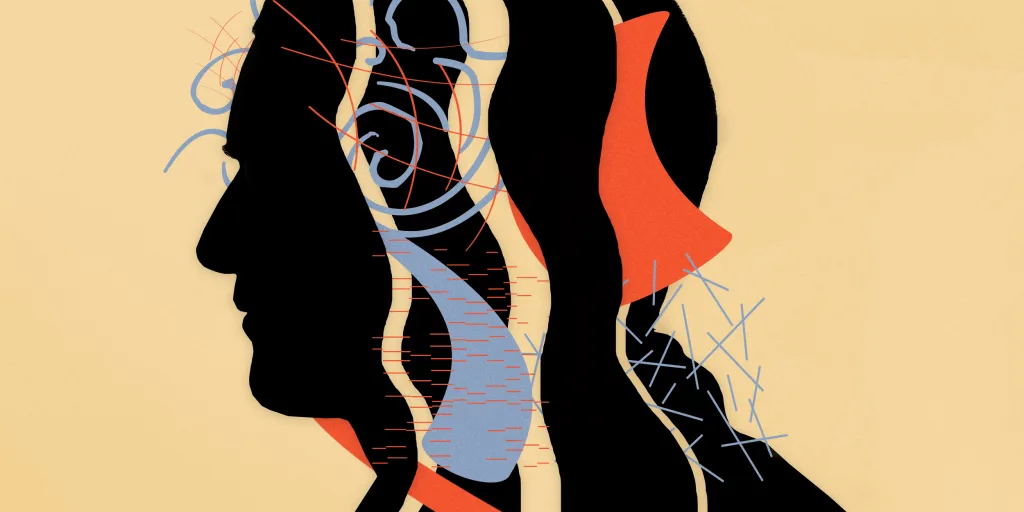Asperger’s syndrome is a form of autism that can cause difficulty in social interactions and communication. People with Asperger’s may have difficulty understanding non-verbal cues, such as facial expressions, and making eye contact. They may take things literally, have difficulty following conversations, and be easily overwhelmed by too much sensory input. While Asperger’s can present many challenges to relationships, it is possible for people with Asperger’s to fall in love just like everyone else.
One of the biggest challenges that people with Asperger’s face when it comes to relationships is understanding non-verbal communication and expressing themselves in a way that their partner can understand. People with Asperger’s often struggle to pick up on their partner’s cues or emotions, which can lead to miscommunication or even arguments. To help combat this problem, it is important for those with Asperger’s to learn how to recognize the body language and facial expressions of those they are interacting with. This will help them better understand their partner’s feelings and respond appropriately.
People with Asperger’s tend to express love differently than neurotypical individuals – often through practical actions rather than words or symbols. It’s important for partners of those with Asperger’s to be aware of this difference and try to be understanding when teir partner expresses love in different ways than they do. It is also important for those with Aspergers to make an effort to express their love clearly so that their partner knows how they feel about them.
It also helps if both partners are aware of the potential challenges that might arise due to the differences in communication styles between neurotypical and neurodiverse individuals. Being open about these issues can help both partners feel more comfortable communicating and resolving conflicts should they arise.
Overall, while there may be some unique challenges associated with having a relationship with someone who has Aspergers Syndrome, it is absolutely possible for two people who both have – or one has – this diagnosis to fall in love just like anyone else would! With patience, understanding and openness on both sides, relationships between neurotypical and neurodiverse individuals can be healthy, happy ones!
Can People With Autism Experience Love Quickly?
The answer to this question is that it depends. Some people with autism may fall in love quickly, while othes may take longer to form a connection. The speed at which someone with autism falls in love is likely affected by many factors, including the person’s comfort level with socializing, the strength of their emotional connections, and how well they understand their own feelings and emotions. Additionally, someone’s personality type and life experiences may also play a role in how quickly or slowly they are able to form romantic relationships. Ultimately, every person’s experience of falling in love is unique and will depend on individual circumstances.

Can People with Asperger’s Syndrome Experience Love?
Yes, people with Asperger’s can fall in love. While the difficulties experienced in forming relationships and communication skills assciated with Asperger’s can make establishing and maintaining an intimate relationship more challenging, it is certainly possible for individuals with Asperger’s to experience strong feelings of love and connection. People with Asperger’s may require more support or guidance when navigating the complexities of relationships, but they are capable of forming meaningful romantic bonds like anyone else. With patience, understanding, and a willingness to learn new skills, many people with Asperger’s have found long-term success in their romantic relationships.
How Aspies Express Love When They Fall in Love
Aspies tend to express love through practical actions, such as doing things to help or make their loved one’s life easier. This could include taking care of daily tasks, running errands, cooking meals, or offering emotional support. They may also show their love through physical affection and quality time. They may not be as verbal as NTs in expressing their love, but they will often demonstrate it through their actions. Aspies tend to take relationships seriousy and are committed to providing for their loved ones in whatever way they can.
Can People With Aspergers Make Good Partners?
People with Aspergers can make excellent partners. As with any relationship, it is important to understand that everyone brings their own strengths and weaknesses to the table. People with Aspergers often have a unique perspective on life, and can offer valuable insight and emotional intelligence to a relationship. They may be more analytical than neurotypical people, but this can also be a great asset in problem solving. People with Aspergers also tend to be very loyal and committed partners who will go out of their way to please their partner. They may need some extra help understanding social cues or expressing emotions, but with patience and understanding from both partners this can be navigated successfully. Ultimately, it comes down to finding someone who understands you, accepts you for who you are, and is wiling to work through the challenges that come up in any relationship.
Showing Love to Autistic Men
Autistic men may show their love by doing practical things for their partner, such as cooking or cleaning. They might also show their affection through subtle acts of kindness, such as bringing home small gifts or offering to help with a task. Autistic men may also express love and affection by spending time with their partner and being supportive in difficult times. Physical contact is oftn difficult for autistic men, so they might express their love through non-verbal communication such as writing cards, making art together, or simply just being present and listening.

The Impact of Autism on Intimacy
Individuals with autism spectrum disorder (ASD) often have difficulty understanding and responding to social cues, which can make connecting with another person on an intimate level more challenging. Additionally, many individuals with ASD may struggle to express themselves verbally and nonverbally, leading to difficulty communicating their wants and neds in a relationship.
Due to the rigidity and need for repetition of those with ASD, activities that involve spontaneity or playfulness–such as sexual contact–may be difficult. Sensitivity to physical contact and anxiety related to internal sensations created by physical intimacy may also be a concern. Individuals with ASD may also have difficulty understanding the complexities of relationships, such as establishing boundaries, consent, negotiation of sexual activity, and communication abot sex. As a result, they may need support in order to develop meaningful intimate connections.
The Loyalty of People with Aspergers
Absolutely! People with Asperger’s Syndrome are kown for being incredibly loyal and reliable. They have strong moral principles and a deep sense of ethics, which usually translates into an unwavering loyalty to their relationships. People with Asperger’s Syndrome are devoted partners who are often more concerned about the well-being of their partner than themselves. They want their partner to be happy, and they will go above and beyond to make sure that happens. Additionally, people with Asperger’s Syndrome often display admirable traits such as honesty, empathy, and humour that can strengthen relationships even further.
The Challenges of Establishing Relationships for People with Aspergers
People with Asperger’s syndrome struggle with relationships because the defining characteristics of the syndrome can make it difficult for them to interpret and respond to social cues in a way that is considered normal. This can cause them to misinterpret the intentions of their partner and make it harder for them to relate on an emotional level. Additionally, people with Asperger’s oten had negative experiences with peers during childhood which may have caused them to have difficulty forming meaningful connections as adults. Finally, they may not meet their partner’s expectations if they are unaware of the nuances of social behavior in relationships or lack the appropriate communication skills. All these difficulties can lead to an increased likelihood of relationship problems for people with Asperger’s syndrome.
Navigating the Dating Scene with Aspergers
Yes, dating can be particularly challenging for adults with High-Functioning Autism or Asperger’s. Such individuals often have difficulty interpreting social cues and body language, which can make it difficult to discern if their romantic interest is bing honest. Furthermore, they may misinterpret the other person’s intentions or expressions of interest as rejection or lack of interest. This can lead to feelings of insecurity and inadequacy, making it difficult to build a meaningful relationship. Additionally, adults with autism may struggle with communication difficulties such as difficulty expressing themselves verbally or understanding the nuances of conversation, which can further impact their ability to develop meaningful relationships. Furthermore, since many individuals with autism tend to focus on details rather than the big picture when it comes to emotions and relationships, they may fail to recognize underlying patterns in how people interact and express themselves romantically. However, by understanding their unique needs and strengths and cultivating a supportive environment with an understanding partner, individuals with autism can still have successful romantic relationships.

The Challenges of Being Married to a Man with Asperger’s
Being married to a man with Asperger’s can be an incredibly challenging and rewarding experience. On one hand, having a partner with Asperger’s can provide unique opportunities for growth, understanding, and connection that can be found in no other relationship. On the other hand, living with someone who has Asperger’s can bring its own set of challenges. Many individuals with Asperger’s struggle to understand social cues or express emotions in a healthy way, which can lead to misunderstandings and hurt feelings. Additionally, many men with Asperger’s have difficulty picking up on non-verbal cues from their partner, making it hard for them to appropriately respond or react in certain situations. This lack of emotional reciprocity can make it difficult for partners to feel connected and secure in the relationship. However, by taking the time to learn more about Asperger’s and how it affects your partner’s behavior and communication style, it is possible to create a strong bond and build a successful marriage. With patience, understanding, and open communication, couples are oten able to learn how to manage their differences and create a lasting relationship based on mutual respect.
Expressing Love as an Autistic Person
An autistic person can express love in many different ways. They may demonstrate ther affection through acts of service, such as running errands or doing chores for their partner, or through thoughtful gifts or gestures. Autistic people may also show their love in more traditional ways, such as expressing words of affection or being physically affectionate. Some autistic people are able to connect emotionally with others in a way that is meaningful to both parties and can share intimate moments together. Ultimately, the best way for an autistic person to express love is whatever works best for them and their partner.
How to Make an Aspie Happy
An Aspie’s happiness comes from a combination of self-acceptance, understanding and empathy from those around them, and a realistic set of expectations for those relationships. Self-acceptance means understanding one’s own strengths and weaknesses, as well as accepting that one is different from other people. Understanding and empathy from others involves recognizing the different ways in which an Aspie may think or behave, and being supportive and patient with them. Finally, having realistic expectations of others ensures that an Aspie is not setting themselves up for disappointment when the people around them don’t meet those expectations.
Dating Someone with Aspergers: What to Know
When dating someone with Aspergers, it’s important to keep in mind that they experience the world differently from typical individuals. Aspergers is a form of autism, which impacts the way people interact socially, communicate and process sensory information. People with Aspergers may have difficulty understanding nonverbal cues, such as facial expressions and body language, and may be hypersensitive to certain stimuli like bright lights or loud noises. It is important to be patient and understanding when interacting with someone who has Aspergers. Respect their boundaries and don’t take it personally if they don’t respond in a “typical” manner. Ask questions if you are unsure of how to proceed. When dating someone with Aspergers, it can help to plan activities ahead of time so that the individual can feel more comfortable in social situations. It is also helpful to provide structure and routines so that your partner can feel safe and secure. Do not forget to talk about yourelf too – it is important that both partners feel heard, respected and appreciated in a relationship.
Can People with Aspergers Show Empathy?
Yes, individuals with Asperger profiles can have empathy. While they may not necessarily express it in the same way as someone without the disorder, they do have the capacity to feel and identify with others’ emotions. For example, they may not necessarily show thir feelings outwardly or their facial expressions might not match up with what they are feeling on the inside. With appropriate support and guidance, people with Asperger profiles can learn to recognize and respond to others’ emotions in a meaningful way.
Are People With Asperger’s Susceptible to Gullibility?
People with Asperger’s Syndrome can be more trusting and naive than the general population. They may lack the ability to read social cues, making it difficult for them to recognize when people are untrustworthy or trying to manipulate them. While they may be more gullible, it is important to remember that they are not stupid; rather, they may just not have the experience or knowledge necessary to determine when someone is being dishonest. As a result, it is important for family and friends of people with Asperger’s Syndrome to provide guidance and education on how to tell if someone is being genuine or deceptive.
Conclusion
In conclusion, Asperger’s is a developmental disorder that affects the way in which individuals interact with others. It is characterized by difficulty in social interaction, repetitive behavior and difficulty understanding nonverbal communication. While there are challenges associated with living with Asperger’s, many people are able to lead fulfilling lives with proper support and understanding from those around them. With support and guidance, those diagnosed can learn to manage their symptoms and even build meaningful relationships with peers and loved ones. By creating more awareness abot this condition, we can help create an environment where those affected can thrive.
